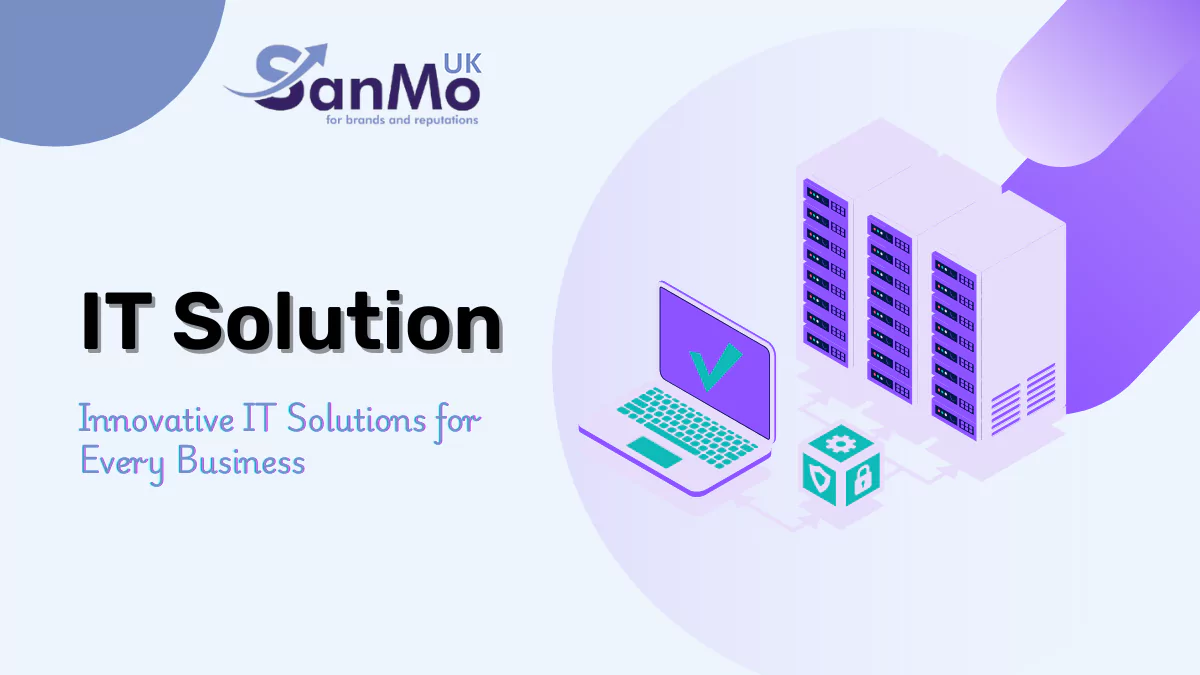Discover Innovative IT Solutions for a Digital Era—your reliable partner in crafting strategic IT approaches that enhance operations, optimize data, and fuel business expansion. Dive into customized technology strategies to gain a competitive edge in today’s fast-paced digital environment.
IT solutions encompass a range of software, applications, programs, and services designed to aid organizations in managing and improving their business processes. These solutions aim to streamline operations, boost efficiency, and tackle specific challenges, helping businesses thrive in a competitive digital realm.
Our IT solutions are tailored to address various needs. They include offerings like cloud computing, cybersecurity, enterprise resource planning (ERP) systems, and customer relationship management (CRM) software. For instance, cloud solutions provide scalable storage and accessibility, essential for companies wanting to manage data without hefty upfront infrastructure costs. Cybersecurity measures protect organizations from potential cyber threats, safeguarding crucial data and maintaining customer trust.
These solutions are also vital for enhancing decision-making. With advanced data analytics tools, businesses can collect, analyze, and interpret data, gaining insights into market trends, customer behaviors, and operational efficiencies. This data-driven method empowers organizations to make informed decisions, allocate resources wisely, and adapt to shifting market needs.
Beyond resolving operational hurdles, IT solutions promote improved communication and collaboration within teams. Tools like project management software and collaboration platforms enhance workflows, allowing employees to work together more effectively.
In conclusion, IT solutions serve as invaluable assets for modern enterprises, helping them overcome challenges, boost productivity, and stay agile in a constantly evolving market.
What is the meaning of IT solution?
IT solutions, often referred to as IT business solutions, encompass a wide array of software, applications, programs, and IT services designed to assist companies in optimizing their operations and tackling specific business challenges. In today’s digital-centric environment, where efficiency, agility, and adaptability are crucial for success, these solutions are indispensable.
They cover areas like cloud computing, cybersecurity, data analytics, customer relationship management (CRM) systems, and enterprise resource planning (ERP) software. For instance, cloud-based solutions enable businesses to expand their data storage and access capabilities without significant investments in infrastructure. On the other hand, cybersecurity solutions are vital for safeguarding sensitive information and maintaining customer trust during this digital age.
A standout feature of IT solutions is their ability to convert data into actionable insights. Utilizing data analytics tools, businesses can sift through extensive data sets to spot trends, predict customer behavior, and enhance their operations. This data-driven approach allows organizations to remain competitive, manage resources wisely, and swiftly adapt to market fluctuations.
Furthermore, IT solutions foster improved communication and collaboration within teams.
Beyond merely addressing current challenges, IT solutions strategically position businesses for innovation and growth. In essence, IT business solutions empower organizations to navigate obstacles, enhance productivity, and remain nimble in an ever-changing digital landscape.
What are IT software solutions?
A “Software Solution” refers to specialized software programs and packages designed to address various security and operational needs. These solutions aim to safeguard systems, networks, and data from a multitude of cyber threats, ensuring a secure and resilient IT environment. Essential components of a solid software solution include intrusion detection systems (IDS), firewalls, antivirus applications, and network management tools, each serving a critical role in protecting business assets.
Intrusion Detection Systems (IDS) are crucial for detecting and alerting on unauthorized access attempts and potential security breaches, enabling proactive responses. Firewalls serve as the initial defense, regulating incoming and outgoing traffic to block unauthorized access. Meanwhile, antivirus software identifies and eliminates malware that could jeopardize system integrity. Together, these tools defend against a range of threats, from malware to data leaks.
Network management tools are also indispensable, ensuring reliable network performance. Effective management not only enhances performance but also minimizes the potential vulnerabilities that attackers could exploit. Regular updates, such as operating system and software patches, are vital for addressing security gaps and shielding against newly identified vulnerabilities.
A well-rounded software solution integrates these individual tools into a unified security framework. This integration simplifies management, allowing IT teams to oversee and enforce security measures from a single interface. Additionally, these solutions are often scalable, enabling businesses to expand or upgrade components as their security requirements change.
In today’s dynamic cyber landscape, where threats continuously evolve, these solutions combine detection, prevention, and real-time management. They equip organizations with the necessary tools to protect their digital infrastructure, uphold compliance, and foster trust with clients and stakeholders.
What is the purpose of IT solutions?
At the heart of IT solutions lies their ability to help businesses effectively manage and utilize data, ultimately leading to improved decision-making and operational success. These solutions allow organizations to extract meaningful insights from extensive information related to customers, employees, services, and processes.
Take Customer Relationship Management (CRM) systems, for example. They enable companies to keep detailed records of customer interactions, preferences, and histories, which leads to more personalized marketing efforts and enhanced customer satisfaction. Likewise, Human Resource Management Systems (HRMS) simplify the handling of employee data, making payroll processing, performance tracking, and resource planning more efficient.
Data analysis tools within IT solutions are invaluable for understanding operational trends and performance metrics. By gathering and analyzing data, businesses can spot areas for improvement, cut down on inefficiencies, and anticipate future challenges. For instance, predictive analytics can enable companies to foresee customer needs and optimize inventory, while reporting tools present data in easy-to-understand formats, aiding strategic discussions and informed decision-making.
Additionally, IT solutions enhance how information is shared and presented throughout an organization. With features like automated reporting and real-time dashboards, these tools help teams stay aligned with the company’s objectives. This transparency fosters collaboration and encourages a culture of accountability and responsiveness.
In summary, IT solutions are essential for businesses that want to unlock the full potential of their data. By streamlining processes related to data creation, management, analysis, and presentation, these solutions bolster productivity, agility, and innovation, positioning businesses to thrive in today’s data-driven landscape.
What are the benefits of IT solutions?
Implementing IT solutions, especially those that are cloud-based, allows organizations to drastically cut down or even eliminate the costs tied to buying, installing, and maintaining on-premise hardware and software. By taking advantage of cloud services, businesses can sidestep the hefty initial investments required for physical infrastructure, thereby freeing up funds for other strategic projects.
One of the standout advantages of cloud-based services is their scalability, something that traditional IT setups often struggle with. Companies can easily adjust their usage and expenses based on their current needs, paying only for what they use instead of sinking money into hardware that risks becoming outdated. This flexibility is particularly beneficial for growing businesses or those with variable demands, enabling them to scale their resources up or down as necessary.
Additionally, cloud solutions simplify IT management by shifting maintenance duties to the service providers. Routine tasks like software updates, security patches, and data backups are handled by the cloud providers, which alleviates the workload on internal IT teams and ensures that systems stay current with the latest security measures and performance enhancements.
Beyond cost savings and operational efficiency, cloud-based IT solutions enhance remote work and collaboration. With cloud storage and applications, employees can access their data and tools from virtually anywhere, facilitating flexible work environments and boosting productivity. This level of accessibility is particularly important for organizations with distributed teams or remote work policies, as it helps ensure seamless operations regardless of location.
In conclusion, transitioning to cloud-based IT solutions empowers organizations to lower infrastructure costs, lighten the IT workload, and leverage advanced technology and security. Consequently, companies can focus more on their core objectives, foster innovation, and quickly adapt to the fast-changing business landscape.
The role of IT solutions
At their essence, IT solutions give businesses the tools to efficiently manage and utilize data, ensuring that information is not just accessible, but also meaningful and actionable. By seamlessly integrating state-of-the-art tools and technologies, these solutions simplify the processes related to data collection, management, and analysis. This enables companies to uncover valuable insights that facilitate informed decision-making. Whether it involves customer interactions, employee metrics, services, or operational workflows, IT solutions create a centralized and structured system that boosts productivity and clarity in strategy.
A well-rounded IT solution addresses specific needs of different industries. It enables secure data collection and storage, promotes efficient management for organization-wide accessibility, and ensures easy retrieval when necessary. Businesses can identify patterns, trends, and key metrics that drive customer satisfaction, operational efficiency, and growth. Additionally, these solutions optimize resources and workflows, simplifying the identification of improvement areas and allowing for swift adaptations to changing market demands.
With advanced reporting and presentation features, IT solutions allow businesses to convert raw data into insightful reports that can be shared across departments. These reports highlight critical insights into customer behavior, employee performance, and service quality, empowering leaders to make proactive, data-informed decisions. Moreover, IT solutions enhance collaboration by providing everyone in the team with consistent, up-to-date information, which in turn improves communication and alignment throughout the organization.
In summary, IT solutions are invaluable assets for any business aiming to remain competitive in a data-driven landscape. By centralizing and optimizing data management, they enhance both operational and strategic functions, equipping businesses with the insights and agility required to excel in today’s fast-paced environment.
In the current digital realm, IT solutions are vital for businesses aiming to grow, innovate, and remain competitive. By harnessing advanced technologies, these solutions offer the infrastructure and tools needed to streamline operations, boost productivity, and enhance data-driven decision-making. They optimize data management, bolster cybersecurity, and improve communication and collaboration across teams, empowering organizations to leverage technology for tangible growth.
Effective IT solutions do more than just solve immediate issues; they provide businesses with dynamic tools for enduring success. For instance, comprehensive data management systems enable firms to handle and interpret large volumes of data, transforming it into actionable insights that enhance customer engagement, employee productivity, and service or product offerings. Additionally, cloud solutions and secure networks offer the flexibility to scale operations and optimize resource management, allowing companies to swiftly adapt to market shifts and internal changes.
Moreover, IT solutions form the cornerstone of any business’s digital transformation journey. As more companies adopt digital-first strategies, the need for reliable, agile IT systems becomes paramount. Cybersecurity is a fundamental aspect of these solutions, crucial for safeguarding sensitive data from breaches and preserving trust with customers and stakeholders. Employing a robust IT strategy allows organizations to minimize risks, reduce costs, and ensure compliance with industry regulations.
In summary, IT solutions are more than just technological assets—they are strategic tools that enable businesses to build resilience, drive innovation, and maximize efficiency in a fast-changing market. By continually refining IT systems, companies can enhance their capabilities, achieve operational excellence, and prepare for the future. As technology evolves, those equipped with thorough IT solutions will be in a stronger position to lead, adapt, and flourish in the digital age.







